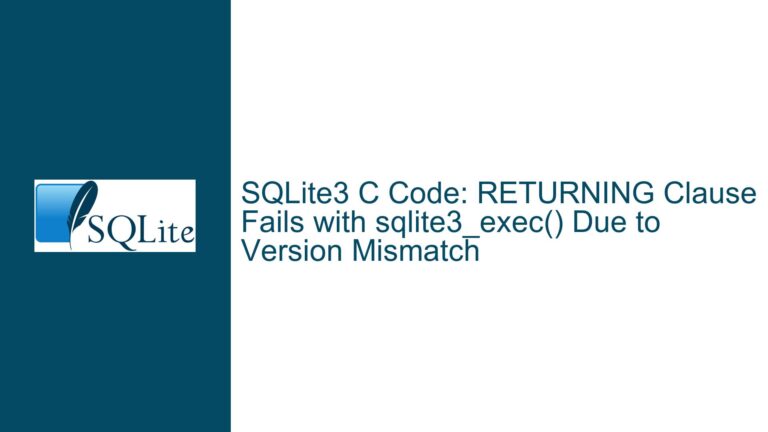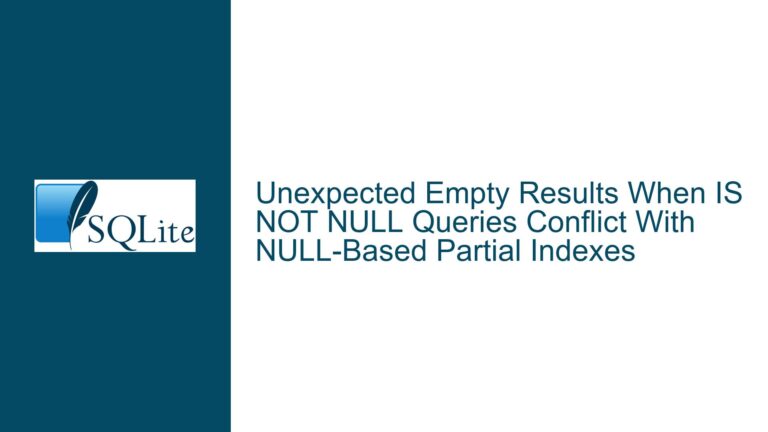Optimizing JSON Filtering and Escaping Issues in SQLite
JSON Filtering Performance and Escaping Challenges in SQLite
SQLite is a powerful, lightweight database engine that supports JSON through its json1 extension. However, when working with JSON data, particularly in large datasets, performance and correctness can become significant concerns. This post delves into the nuances of optimizing JSON filtering operations and addresses the challenges posed by escaped characters in JSON keys and values.
Performance Implications of JSON Filtering with LIKE and ->> Operators
The core issue revolves around the performance disparity between using the LIKE operator and the ->> operator for filtering JSON data. Consider a table t1 with a column c1 containing 30 million JSON objects. The following queries demonstrate the performance difference:
-- Query A
SELECT * FROM t1 WHERE c1 LIKE '%key%value%' AND c1 ->> 'key' = 'value';
-- Query B
SELECT * FROM t1 WHERE c1 ->> 'key' = 'value';
Query A, which combines the LIKE operator with the ->> operator, runs significantly faster than Query B, which relies solely on the ->> operator. This performance gap arises because the LIKE operator can quickly narrow down the dataset by performing a simple string match, reducing the number of JSON objects that need to be parsed by the ->> operator.
However, this approach is not without its pitfalls. The LIKE operator performs a raw string match, which can lead to false positives if the JSON data contains escaped characters or if the key-value pairs are not formatted as expected. For example, if the JSON data contains escaped Unicode characters (e.g., \u0061 for a), the LIKE operator may fail to match the intended pattern.
Escaped Characters in JSON Keys and Values
The handling of escaped characters in JSON keys and values is a critical aspect of JSON filtering in SQLite. According to the JSON specification (RFC 8259), any character in a key or value can be escaped using the \uXXXX notation, where XXXX is a Unicode code point. However, SQLite’s json1 extension does not consistently handle these escaped characters, leading to potential mismatches and incorrect query results.
Consider the following JSON object:
{"\u0061":"\u0062"}
This object is semantically equivalent to:
{"a":"b"}
However, SQLite’s json_extract function and the ->> operator do not always recognize escaped characters in JSON keys. For example:
SELECT json_extract('{"\u0061":"\u0062"}', '$.a') AS value;
This query returns NULL because the json_extract function does not interpret the escaped key \u0061 as a. Similarly, the ->> operator fails to match the key when it contains escaped characters:
SELECT '{"\u0061":"\u0062"}' ->> '$.a';
This query also returns NULL. The inconsistency in handling escaped characters can lead to unexpected behavior, particularly when querying JSON data that contains non-ASCII characters or other escaped sequences.
Troubleshooting JSON Filtering and Escaping Issues
To address the performance and correctness challenges associated with JSON filtering in SQLite, consider the following steps:
1. Optimize JSON Filtering with Combined Operators
When filtering large JSON datasets, combine the LIKE operator with the ->> operator to leverage the performance benefits of string matching while ensuring the accuracy of JSON extraction. For example:
SELECT * FROM t1 WHERE c1 LIKE '%key%value%' AND c1 ->> 'key' = 'value';
This approach reduces the number of JSON objects that need to be parsed by the ->> operator, improving query performance. However, be cautious of false positives caused by escaped characters or unexpected JSON formatting.
2. Normalize JSON Data to Handle Escaped Characters
To mitigate issues with escaped characters, normalize JSON data before inserting it into the database. This involves converting escaped Unicode sequences to their corresponding characters and ensuring consistent formatting. For example, use a tool like jq to preprocess JSON data:
cat input.json | jq -c . > normalized.json
This command processes the JSON data in input.json, converts escaped characters, and outputs the normalized JSON to normalized.json. Import the normalized JSON into SQLite to ensure consistent query results.
3. Use Workarounds for Escaped Character Handling
If normalizing JSON data is not feasible, use workarounds to handle escaped characters in queries. For example, include additional conditions to account for escaped sequences:
SELECT * FROM t1 WHERE (c1 LIKE '%key%value%' OR c1 LIKE '%\u%') AND c1 ->> 'key' = 'value';
This query accounts for the possibility of escaped characters in the JSON data, reducing the likelihood of false negatives. However, this approach may still miss some cases, particularly if the JSON data contains complex escape sequences.
4. Report and Monitor JSON Handling Issues
If you encounter issues with SQLite’s handling of JSON data, report them to the SQLite development team. While SQLite does not have a public issue tracker, you can raise concerns on the SQLite forum, where developers monitor discussions and file issues as needed. For example, the inconsistency in handling escaped characters in JSON keys has been acknowledged by the SQLite team, but it remains a low-priority issue due to its limited impact on real-world applications.
5. Consider Alternative JSON Representations
For applications that require strict JSON compliance and consistent handling of escaped characters, consider using alternative JSON representations, such as CBOR (Concise Binary Object Representation). CBOR is a binary format that avoids the complexities of JSON escaping and provides more predictable behavior. However, this approach requires additional tooling and may not be suitable for all use cases.
Conclusion
Optimizing JSON filtering in SQLite requires a careful balance between performance and correctness. By combining the LIKE and ->> operators, normalizing JSON data, and using workarounds for escaped characters, you can improve query performance while minimizing the risk of incorrect results. Additionally, staying informed about SQLite’s limitations and reporting issues to the development team can help drive improvements in JSON handling over time. For applications with stringent JSON compliance requirements, consider alternative representations like CBOR to avoid the pitfalls of JSON escaping.






